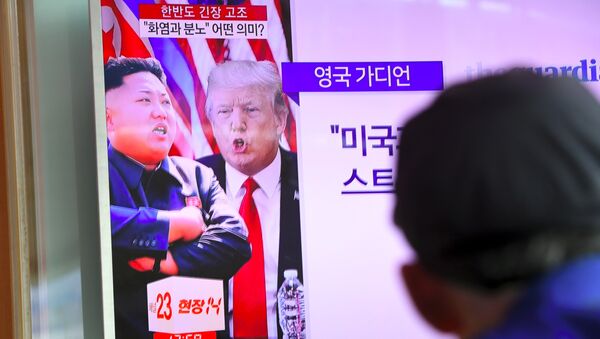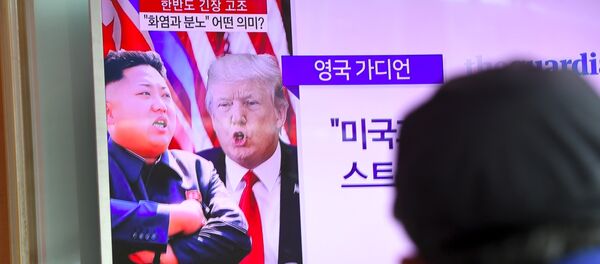With a war of words between the United States and North Korea ramping up over recent weeks the question arises whether the two are really up to starting an all-out confrontation.
"Military solutions are now fully in place, locked and loaded, should North Korea act unwisely. Hopefully, Kim Jong Un will find another path!" US President Donald Trump tweeted Friday.
Military solutions are now fully in place,locked and loaded,should North Korea act unwisely. Hopefully Kim Jong Un will find another path!
— Donald J. Trump (@realDonaldTrump) 11 августа 2017 г.
The tweet came as an apparent response to a state-run Korean Central News Agency (KCNA) report, which stated that Pyongyang has a plan to launch four intermediate-range missiles at the US territory of Guam, where American military bases are located.
However, according to Michael Madden, a Korea expert and visiting scholar at the US-Korea Institute at the School for Advanced International Studies at Johns Hopkins University, there's no indication from North Korea or the United States "that something tangible is going forward."
Speaking to Radio Sputnik Madden drew attention to the fact that regardless of its warmongering rhetoric Pyongyang is very careful in its choice of words.
"North Korea is very careful in how it formulates its statements…. And if we go to the two statements that have come out from North Korea's Strategic Forces, its missile forces, this is always couched in a very sort of hypothetical language…. The phrases keep coming up: 'we are seriously considering.' They have not done anything yet!" Madden underscored.
"One thing we are underestimating is the North Korean policymakers' understanding of American politics and of global politics. They are a lot more sophisticated than we think they are," Madden remarked.
Commenting on Washington's alarmist rhetoric in regard to Pyongyang, the American scholar suggested that the US leadership is trying to conceal some problems the United States is having in the National Security Council.
There could also be a "disconnect" between some of the key US foreign policy makers, he added.
Meanwhile, Russia and China continue to call upon Washington and Beijing to take steps to defuse tensions, citing security concerns.
Russian Foreign Minister Sergei Lavrov told reporters Friday that the risk of a conflict between the US and North Korea turning into a full-fledged war is high.
"The risk is very high, especially regarding the rhetoric [between the two countries]. We hear direct threats to use force…. Of course, this concerns us very much," Lavrov said Friday, adding, however, that he believes that common sense will prevail in the situation.
Meanwhile, China's influential online newspaper Global Times signaled that Beijing will stay neutral if North Korea attacks the United States, adding that "if the US and South Korea carry out strikes and try to overthrow the North Korean regime and change the political pattern of the Korean Peninsula, China will prevent them from doing so."
Commenting on the issue, Madden pointed out that Beijing is obviously not happy with Pyongyang conducting nuclear and missile tests.
The scholar pointed to what may seem an inconsistent policy on the part of Beijing: on the one hand China hesitates to isolate its troublesome neighbor, but on the other hand the Chinese leadership has recently adopted a package of UN sanctions against North Korea.
Madden explained that the destabilization of North Korea may result in serious security problems for China, including the influx of refugees from the DPRK.
One of the reasons why China is trying to join the sanctions "is that they hope that maybe this would create the conditions in which they could start to have dialogues or six-party talks, some other multilateral or even bilateral form," the US scholar suggested.
"So they think that at some point maybe the North Koreans will engage in some sort of [dialogue]," Madden told Radio Sputnik.





